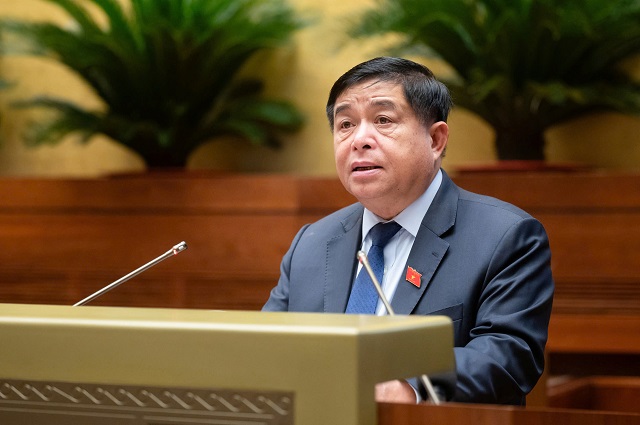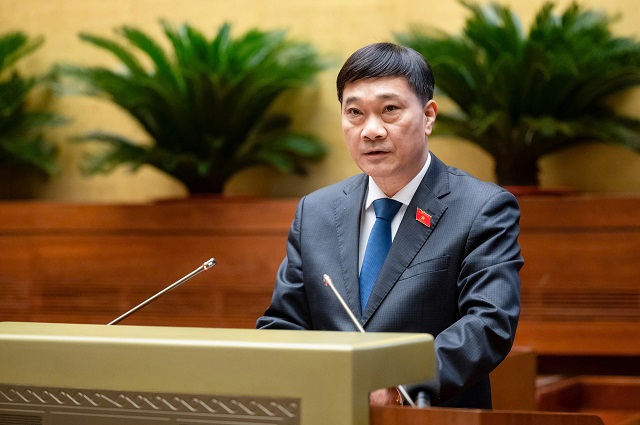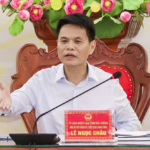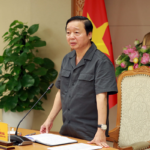## Simplifying Administrative Procedures, Promoting Decentralization and Devolution
**Minister of Planning and Investment Nguyen Chi Dung presents the proposal**
Minister of Planning and Investment Nguyen Chi Dung presented a proposal to amend and supplement several articles of the Law on Planning, Investment, Public-Private Partnership (PPP) Investment, and Bidding Law. He emphasized the need to promptly address urgent institutional challenges, simplify administrative procedures, and promote decentralization and devolution in planning, business investment, PPP investment, and bidding.

Minister of Planning and Investment Nguyen Chi Dung
|
**Law Amendments Focus on Resolving Urgent Issues**
The law amendments closely follow the principle of focusing on modifying contradictory provisions that cause obstacles and require urgent changes to facilitate investment, production, and business operations. Any changes must be clearly defined and their impacts assessed. The amendments also ensure independence, stability, and continuity while upholding the integrity of the comprehensive legal framework. Additionally, they guarantee compatibility with Vietnam’s international treaties and commitments.
**Amendments to the Planning Law**
The Planning Law amendments clarify the relationship between technical and specialized planning and the national planning system. This addresses challenges related to the basis for developing plans when higher-level plans have not been approved. The term “urban and rural planning” is now designated as “technical and specialized planning” to align with the nature of this type of planning and maintain consistency with the draft Urban and Rural Planning Law.
**Amendments to the Investment Law**
The Investment Law amendments devolve the authority to approve investment proposals from the Prime Minister to the provincial People’s Committees for certain types of projects. These include constructing and operating industrial parks and export processing zones, building new ports or port areas with investment capital below VND 2,300 billion in special seaports, and investing in projects within the protection zones of national and special national monuments. This devolution empowers local authorities and enhances their autonomy.
**Amendments to the Law on Investment in the Form of Public-Private Partnership (PPP)**
The amendments to the Law on PPP Investment encourage the application of the PPP model for all projects in the field of public investment providing public products and services, except for projects in sectors exclusively managed by the state or related to national defense, security, and social order and safety. The minimum investment capital scale requirement for PPP projects has been removed, giving ministries, sectors, and localities the responsibility to consider and decide on suitable projects according to their needs and investors’ capabilities.
**Amendments to the Bidding Law**
The Bidding Law amendments allow for the approval of bidding results before a project is approved or a contract is signed with the winning bidder. This helps save time and accelerate project implementation. Additionally, restricted bidding, international bidding, and domestic bidding are permitted when development partners or foreign donors require these forms as binding conditions during the negotiation and signing of international treaties or foreign loan agreements.
**Scrutinizing the Proposal to Avoid Overlaps, Contradictions, and Challenges in Applying the Law**
The Economic Committee, headed by Vu Hong Thanh, reviewed the content of the proposal. They agreed with the necessity to amend and supplement the laws included in the project, as stated in the Government’s Proposal No. 675/TTr-CP.

Head of the Economic Committee Vu Hong Thanh
|
**Project Documentation**
The project documentation largely meets the requirements of the Law on Promulgation of Legal Documents. The project proposes to amend and supplement numerous provisions related to planning, business investment activities, PPP investment, and bidding. However, the report on the assessment of impacts is quite general and qualitative, lacking concrete data to demonstrate the urgency and practical challenges. Therefore, it is suggested that the authoring agency supplement and clarify the report. Additionally, it is proposed to supplement the draft decree providing detailed guidance on the implementation of the project.
**Consistency of the Project with the Legal System**
The draft law proposes to amend and supplement a number of provisions related to the order and content of planning, as well as the adjustment of national, regional, and provincial planning. However, at the 7th and 8th sessions, the Government also proposed the issuance of the Law on Geology and Minerals, the amendment of the Law on Electricity, and the Law on Cultural Heritage, which would modify the order and procedures for the formulation, appraisal, approval, and adjustment of national, regional, and provincial planning. Not proposing to amend and supplement the relevant contents of the Planning Law accordingly is inconsistent.
Therefore, the Head of the Economic Committee requested the Government to direct the relevant agencies to review and adjust the draft laws to ensure consistency in the legal system. It is essential to comply with Clause 2, Article 8 of the Law on Promulgation of Legal Documents, avoid overlapping provisions in multiple laws, and prevent contradictions and difficulties in the application of the law. Streamlining the procedures will expedite the formulation, appraisal, approval, and adjustment of planning.
**On the Content of Projects in the National, Regional, and Provincial Planning in the Amendment of the Planning Law**
The Economic Committee proposed to continue reviewing and studying the amendment of relevant provisions related to the assessment of conformity with planning in the Law on Public Investment, the Investment Law, the Law on Investment in the form of PPP, and some draft laws being submitted to the National Assembly, such as the draft Law on Electricity. This aims to ensure feasibility and consistency and prevent obstacles in the implementation process, contributing to resolving urgent and practical difficulties in business investment activities.
**On Special Investment Procedures in the Investment Law**
The Head of the Economic Committee suggested that the Government carefully review and clearly define the subjects eligible for these special investment procedures. It is essential to conduct a thorough impact assessment and ensure that the devolution of authority to grant special investment registration certificates matches the decision-making capacity, organizational structure, and human resources of each management level. Additionally, a sanction regime should be introduced to assign specific responsibilities and handle violations, ensuring the feasibility and effectiveness of the implementation, especially for large-scale and complex projects with significant socio-economic impacts at the local, regional, and national levels.
**On the Fields and Scale of Investment in the Form of PPP and the Minimum Investment Capital Scale for PPP Projects**
The expansion of the scope of application in some localities that are in the pilot phase has not been fully evaluated and summarized. Therefore, it is proposed to review and consider this proposal carefully, along with a thorough assessment.
**On Bidding in Advance in the Amendment of the Bidding Law**
The Economic Committee requested the Government to explain and assess the concrete impacts of applying the provisions on bidding in advance. It is necessary to consider the rights and responsibilities of investors and contractors to establish appropriate regulations that protect the legitimate rights and interests of both parties and prevent complaints and denunciations.
**By Nhật Quang**
The Art of Efficiency: Avoiding the Pitfalls of Ineffective Project Extensions
The Chairman of the People’s Committee of Hai Duong Province has instructed the provincial industrial zone management board to collaborate with relevant departments to review and expedite delayed projects. For projects that are significantly behind schedule, the management board must report to the provincial People’s Committee and propose effective solutions to overcome the delays, avoiding repeated extensions without tangible results.
The Data Law: A Vital Enabler of the Digital Economy
In Vietnam’s accelerating digital transformation journey, the development and enactment of the Data Law is a crucial step towards establishing a robust legal framework for data governance and exploitation. The draft Data Law is currently under discussion, and if passed, it will have far-reaching implications for various sectors, especially national digital transformation, the digital economy, and digital society.
The Local Real Estate Market: Where the Shortage Doesn’t Halt and the Surplus Doesn’t Sell.
“A thorough assessment of the local real estate markets is imperative to identify areas where there is a shortage of development and where there is an oversupply of properties that remain unsold.” This was one of the key messages conveyed by Deputy Prime Minister Tran Hong Ha during the Central Steering Committee meeting on housing policies and the real estate market, held on October 24th.





















